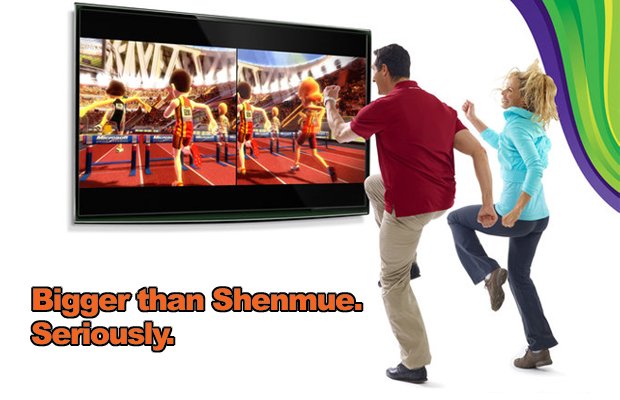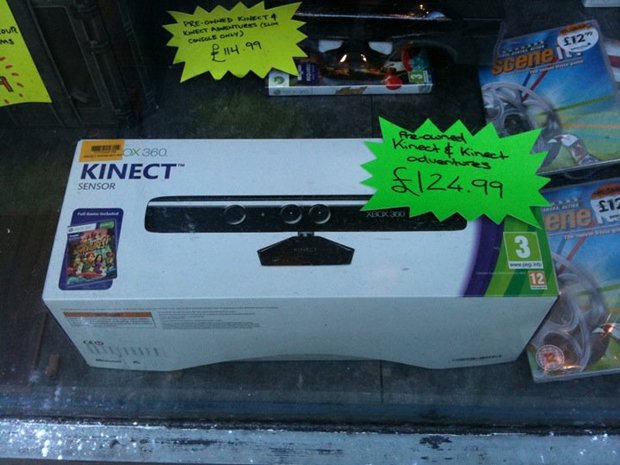Fact: Kinect is fastest-selling consumer gadget EVER. Question: Is anyone actually playing it? Really?
Kinect selling faster than the Wii? Than the iPhone? Really?

At GamesRadar, we get sent a lot of dull press releases about sales figures. "Game X sells 498 copies in western Finland! Becomes fastest-selling marmoset husbandry simulator ever!" We're told things like that a lot, and we never care. But today one such e-mail made us all sit up and take notice. Or rather, sit up, take notice, yell a collective "What the f*ck!?" and question the very nature of reality.
For today we learned that Kinect is the fastest-selling piece of consumer electronics in history, and has already surpassed 10 million sales. Yeah, since November.Since NovemberKinect has sold as many units as the Dreamcast did in its entire lifespan. And while we don't doubt that these figures are accurate, we just can't bring ourselves to believe them.

These Kinect units aren't being bought by hardcore gamers. We get that. It wasn't designed for us. But neither was the Wii, really. And while Nintendo's little white waggle box was created with the purpose of capturing the casual market - and was insanely successful in that respect - as an example of cultural saturation, it hit everyone equally. Kinect, we feel, has not done this in the slightest.
We men of Radar are a socially eclectic bunch. We hang out with folk of every level of gaming awareness, from ultra-granite-hardcore-bastards to people who still think there are ghosts inthe TV whenever they seea video gamerunning. And believe us, the Wii is a cultural touchstone for everyone we know. It gets mentioned at parties. It gets mentioned in the pub. It gets mentioned on trains. We've had discussions about it with strangers while hurtling around on rollercoasters, and we once got into an impromptu chat about Wii Bowling tactics while rescuing an old lady from a mugger. And we were talking to the mugger.
Everyone has a Wii. Everyone talks about the Wii. It's a universally embraced thing. So if Kinect has sold faster than the Wii, why the hell have we never heard anyone talk about it outside the office? Why do we still find people looking at us with confused expressions when we mention it? Why do they get even more confused whentry to explainit? Why have we never seen someone fire it up at a party? Why have we never even seen one in someone's house?

Above: Justin spotted this three days after Kinect's launch. But how common an occurence is it?
It's weird. It's very weird. The elitist cynic in us theorises that Kinect units are being bought in faddish excitement, used briefly, and then consigned to a dusty cupboard. But is that likely? Today's figures also state that Kinect game sales are similarly around 10 million, and while it sounds impressive, that's actually a1:1 hardware/software ratio, whichcertainly implies that people aren't enthusiastically lapping up the games after their initial tech purchase. It would be interesting to get hold of Microsoft's play-time statistics to see just how much people are actually using this thing, butthose numbersweren'tpart of today's statements. That may be telling, or it may not be.
Weekly digests, tales from the communities you love, and more
But what's your experience? Have you found Kinect to have made any kind of cultural impact amongst people you know? Has it become a big deal in any regular practical sense? We're beginning to feel like we're trapped in a crazy anthropological bubble here, so any information you could give us would be seriously appreciated. This mystery needs solving.
For today we learned that Kinect is the fastest-selling piece of consumer electronics in history, and has already surpassed 10 million sales. Yeah, since November.Since NovemberKinect has sold as many units as the Dreamcast did in its entire lifespan. And while we don't doubt that these figures are accurate, we just can't bring ourselves to believe them.

These Kinect units aren't being bought by hardcore gamers. We get that. It wasn't designed for us. But neither was the Wii, really. And while Nintendo's little white waggle box was created with the purpose of capturing the casual market - and was insanely successful in that respect - as an example of cultural saturation, it hit everyone equally. Kinect, we feel, has not done this in the slightest.
We men of Radar are a socially eclectic bunch. We hang out with folk of every level of gaming awareness, from ultra-granite-hardcore-bastards to people who still think there are ghosts inthe TV whenever they seea video gamerunning. And believe us, the Wii is a cultural touchstone for everyone we know. It gets mentioned at parties. It gets mentioned in the pub. It gets mentioned on trains. We've had discussions about it with strangers while hurtling around on rollercoasters, and we once got into an impromptu chat about Wii Bowling tactics while rescuing an old lady from a mugger. And we were talking to the mugger.
Everyone has a Wii. Everyone talks about the Wii. It's a universally embraced thing. So if Kinect has sold faster than the Wii, why the hell have we never heard anyone talk about it outside the office? Why do we still find people looking at us with confused expressions when we mention it? Why do they get even more confused whentry to explainit? Why have we never seen someone fire it up at a party? Why have we never even seen one in someone's house?

Above: Justin spotted this three days after Kinect's launch. But how common an occurence is it?
It's weird. It's very weird. The elitist cynic in us theorises that Kinect units are being bought in faddish excitement, used briefly, and then consigned to a dusty cupboard. But is that likely? Today's figures also state that Kinect game sales are similarly around 10 million, and while it sounds impressive, that's actually a1:1 hardware/software ratio, whichcertainly implies that people aren't enthusiastically lapping up the games after their initial tech purchase. It would be interesting to get hold of Microsoft's play-time statistics to see just how much people are actually using this thing, butthose numbersweren'tpart of today's statements. That may be telling, or it may not be.
But what's your experience? Have you found Kinect to have made any kind of cultural impact amongst people you know? Has it become a big deal in any regular practical sense? We're beginning to feel like we're trapped in a crazy anthropological bubble here, so any information you could give us would be seriously appreciated. This mystery needs solving.



